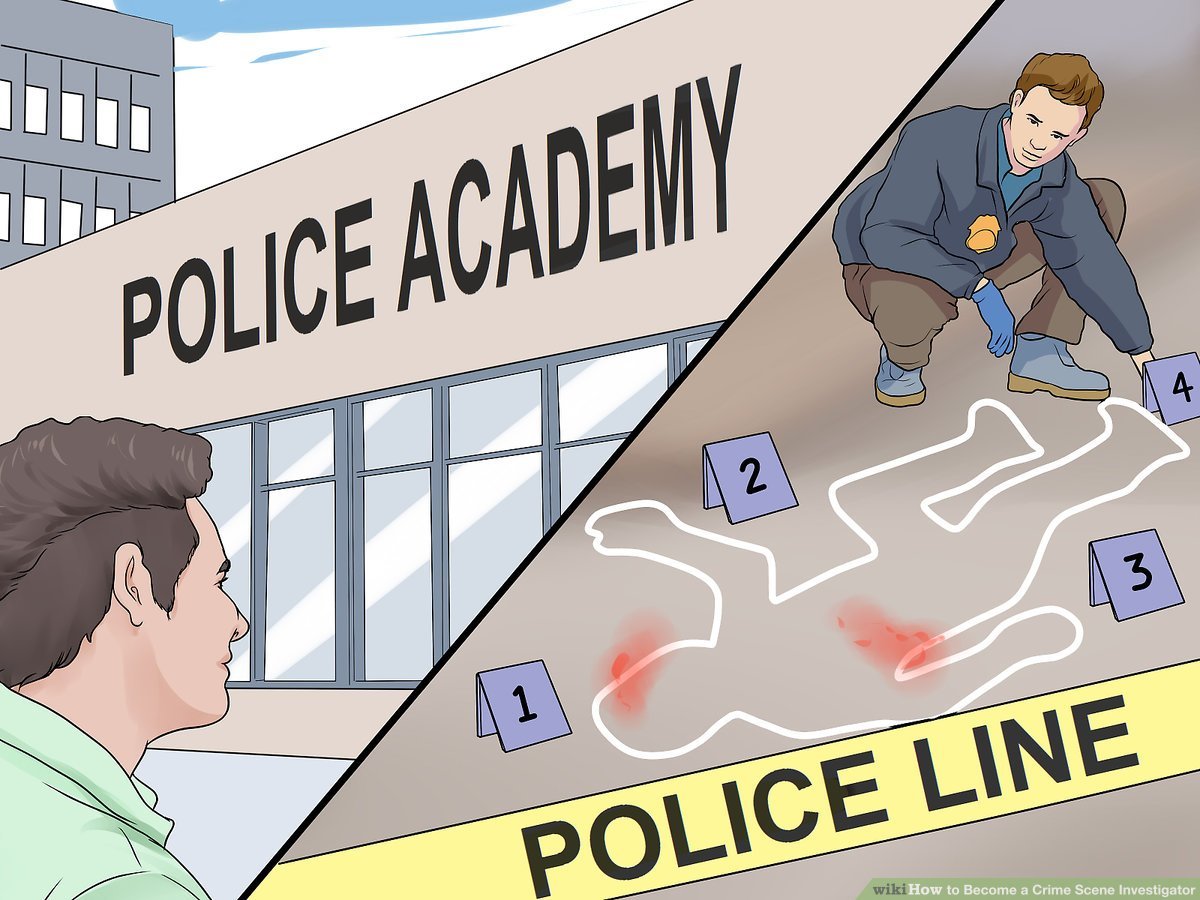If you’ve ever been captivated by crime scenes portrayed in movies or TV shows, you may have wondered how to bring that fascination to life as a career. If investigating crime scenes and using scientific methods to solve mysteries excites you, then becoming a Crime Scene Investigator (CSI) might be the perfect path for you. In this article, we’ll explore the steps needed to embark on this thrilling journey, with a focus on students considering a career in the USA. So, grab your magnifying glass and follow along as we uncover the secrets behind becoming a Crime Scene Investigator!

This image is property of i.ytimg.com.
Steps to Become a Crime Scene Investigator
Becoming a crime scene investigator (CSI) can be an exciting and rewarding career choice for those with a strong interest in solving crimes and analyzing evidence. If you have a passion for forensic science and want to contribute to the justice system, here are the steps you can follow to start your journey as a CSI.
Obtain a Bachelor’s Degree in Forensic Science or a Related Field
The first step in becoming a CSI is to obtain a Bachelor’s degree in forensic science or a related field. Research the educational requirements for CSI positions in your area to ensure that you choose a suitable program. Look for accredited universities or colleges that offer courses in forensic science, biology, chemistry, or criminal justice.
Once you have selected a program, complete the required coursework, which may include subjects like crime scene investigation, forensic chemistry, DNA analysis, and criminalistics. It is important to gain practical experience through laboratory work, as this will help you develop the necessary skills and familiarity with forensic techniques.

This image is property of www.liveabout.com.
Gain Work Experience in a Related Field
While studying for your Bachelor’s degree, it is important to gain work experience in a related field. Consider opportunities to volunteer or intern at forensic laboratories, law enforcement agencies, or medical examiner’s offices. These experiences will not only provide you with valuable insights into the field but also increase your chances of getting hired after graduation.
Additionally, consider developing transferable skills such as critical thinking, attention to detail, and analytical reasoning, as these skills are highly valued in the field of crime scene investigation. Networking with professionals in the field can also help you learn about job openings and potentially secure an entry-level position.
Complete On-the-Job Training or an Internship
Once you have obtained your degree and gained some work experience, it is crucial to gain hands-on training in crime scene investigation through on-the-job training or internships. This will allow you to learn the basics of crime scene investigation and work under the supervision of experienced investigators. You will have the opportunity to collect and analyze evidence, document crime scenes, and understand the standard operating procedures followed in the field.
This practical experience will supplement your theoretical knowledge and help you become familiar with the challenges and complexities of real crime scenes. It is important to make the most of this training period by actively participating and asking questions to enhance your skills and understanding.

This image is property of www.wikihow.com.
Earn Certification
While certification is not always a mandatory requirement for CSI positions, it can significantly enhance your credibility and employability. Research the available certifications in crime scene investigation and determine which ones align with your career goals. Common certifications include the International Association for Identification (IAI) Certified Crime Scene Investigator and the American Board of Criminalistics (ABC) certifications.
Ensure that you meet the eligibility requirements for the certifications you are interested in and prepare for the certification exam accordingly. Thoroughly review the exam content and consider taking preparatory courses or studying independently. Passing the certification exam will demonstrate your proficiency in the field and showcase your commitment to professional development.
Apply for Entry-Level Positions
With your degree, work experience, and potentially a certification under your belt, it’s time to start your job search and apply for entry-level positions in crime scene investigation. Practical experience gained during your education, internships, or on-the-job training will greatly enhance your chances of landing a job.
To increase your chances of success, explore job opportunities through various channels like online job portals, law enforcement agency websites, and networking events. Craft a professional resume and cover letter tailored to each position you apply for, highlighting your relevant education, skills, and experience. Prepare for job interviews by researching common interview questions and practicing your responses.
Apply to relevant positions and be persistent, as securing an entry-level job in crime scene investigation can be competitive. Remember to follow up on your applications and interviews and showcase your enthusiasm and dedication to the role.

This image is property of www.wikihow.com.
Continue Professional Development
As a CSI, it is crucial to continue your professional development to stay updated with the latest advancements in the field. Attend continuing education courses offered by reputable institutions or professional organizations to expand your knowledge and skills. These courses may cover topics such as new forensic techniques, emerging technologies, or legal updates related to crime scene investigations.
Stay informed about the latest technological advancements and scientific literature in the field by regularly reading relevant publications and journals. Consider participating in professional conferences or workshops to network with experts in the field and exchange ideas and best practices.
Gain Specialized Skills and Knowledge
To advance in your career as a CSI, consider gaining specialized skills and knowledge in a specific area of crime scene investigation. Choose a specialization that aligns with your interests and career goals, such as fingerprint analysis, bloodstain pattern analysis, or digital forensics.
Learn techniques and procedures specific to your chosen specialization through specialized training programs or certifications. These specialized skills will make you a valuable asset in the field and open up opportunities for advanced positions or consulting roles.

This image is property of www.ucf.edu.
Advance to Senior Positions
Demonstrating excellence in your performance and taking on leadership roles can pave the way for advancement to senior positions in crime scene investigation. Consistently perform your duties with accuracy, attention to detail, and professionalism. Be proactive in seeking out additional responsibilities and showcasing your problem-solving abilities.
Consider pursuing advanced education, such as a Master’s degree in forensic science or a related field, to expand your knowledge and expertise. This additional education can position you for management roles or higher-level positions within law enforcement agencies or forensic laboratories.
Building a strong professional network is also essential for career advancement. Connect with professionals in the field through networking events, conferences, or online platforms. Take advantage of mentorship opportunities to learn from seasoned investigators and gain valuable insights into your chosen career path.
Consider Pursuing a Master’s Degree
While not always a requirement, pursuing a Master’s degree in forensic science or a related field can be an asset to your career as a CSI. A Master’s degree provides in-depth knowledge and research opportunities that can set you apart from other candidates and open up advanced career prospects.
Research reputable universities or colleges that offer Master’s programs in forensic science and determine the specific program requirements. Consider the focus areas within forensic science that interest you the most, such as DNA analysis, ballistics, or forensic psychology. Pursuing a Master’s degree will require a significant commitment of time and resources, but it can significantly enhance your expertise and job prospects.
Join Professional Organizations
Joining professional organizations in the field of crime scene investigation can provide numerous benefits and opportunities for career growth. Research reputable organizations such as the International Association for Identification (IAI) or the American Academy of Forensic Sciences (AAFS) and become a member of the relevant associations.
Professional organizations offer networking opportunities through conferences, workshops, and online platforms where you can connect with other professionals in the field. Participate in continuing education opportunities provided by the organizations to stay updated with the latest trends and research. These organizations may also offer certifications specific to your area of expertise.
By following these steps, you can embark on a fulfilling and successful career as a crime scene investigator. Stay dedicated, continue to learn and grow, and always strive for excellence in your work. Your contributions to the justice system through forensic science will be invaluable in bringing justice to victims and solving crimes.